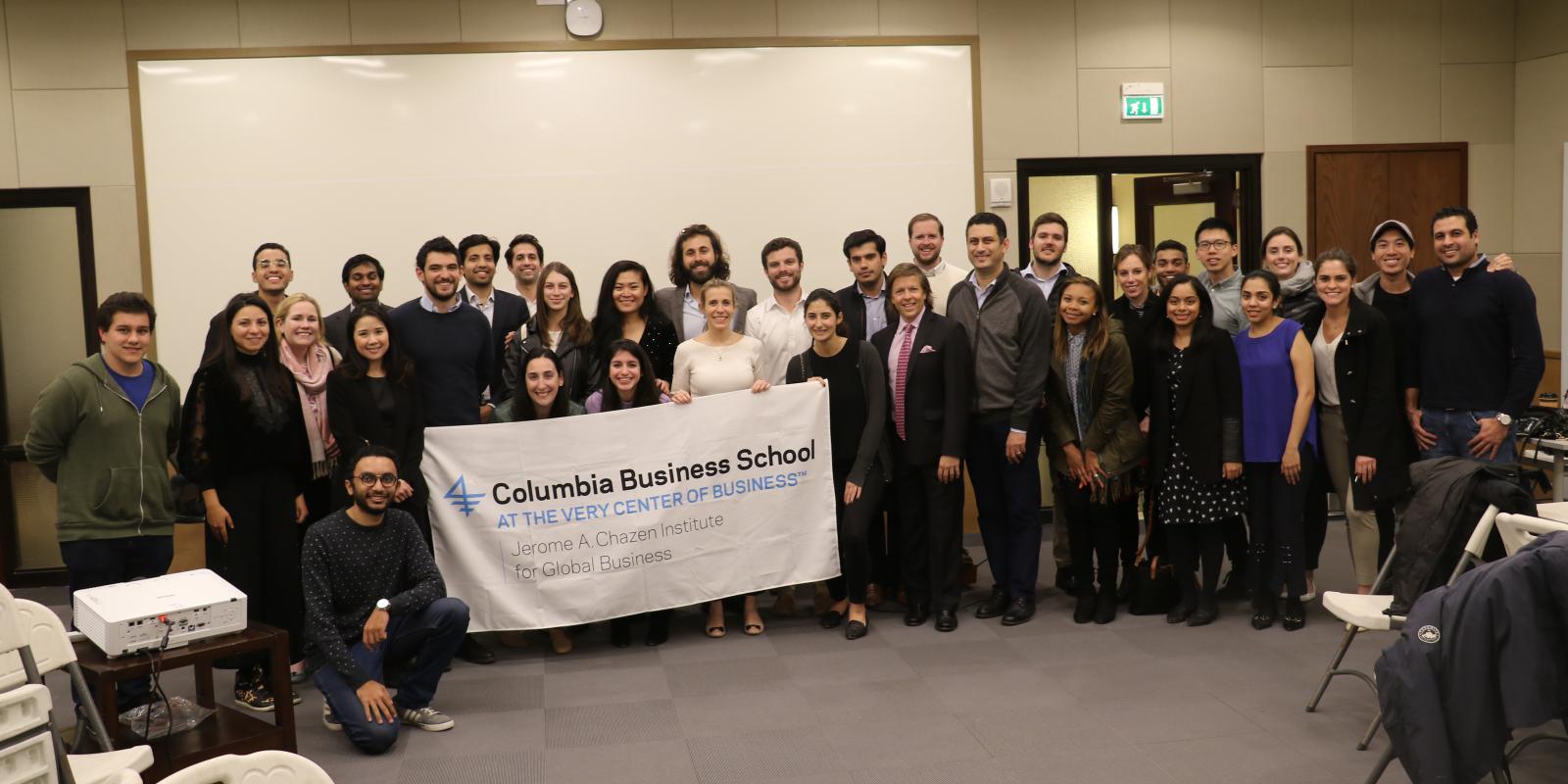
Columbia Business School MBA Students Work with AUC Venture Lab Startups
A group of second-year MBA students from the Columbia Business School spent one week in Cairo as part of a global immersion class conducted in partnership with the AUC Venture Lab. Describing their visit in one word, the students called it “impressive.”
CBS students were paired with a V-Lab startup and worked together throughout the fall semester to create business plans and practice consultation. To complete the class, the students came to Cairo in January to meet with Egyptian business leaders and prepare a final presentation of their work with their assigned startups.
“We had one week to visit companies, government officials, startups, IPOs and banks,” said Marco Viola, adjunct professor at the CBS and teacher of this course. “AUC is the top University in Egypt, and Columbia is a top university in the US, so I think it’s a great partnership.”
The students worked with six startups that had all recently graduated from V-Lab and are in their early stages of business development.
“We are very excited about this partnership,” said Ayman Ismail, Abdul Latif Jameel Endowed Chair in Entrepreneurship, associate professor at AUC's School of Business and founding director of the V-Lab. “We’re trying to provide a platform of internationalization for our Egyptian startups. It’s great exposure to work with people in the Columbia Business School. Many of those people will end up in investment banks, venture capital funds or companies that can offer potential opportunities in the future.”
Kyle Knopick, a CBS student, worked with the startup Amanleek, an insurance tech platform that aims to bring transparency and convenience to insurance purchase in Egypt.
“I was really impressed with the acumen of the founders,” he said. “They were impressive even in pre-launch, pre-revenue, pre-testing and how much thought they had put into their business model. Working with them throughout the last few months has been a really fun, interesting and educative process.”
“I’ve had a great experience at AUC,” said Karan Bains, another CBS student working with Amanleek. “AUC provides great infrastructure, a great platform [for startups] and great programming. I’ve really enjoyed my time here presenting all the work that we’ve done with these founders over the last few weeks.”
And the appreciation for work ethic and expertise went both ways. Ihab Al-Soukary ‘13, co-founder at Amanleek, said that working with the CBS students not only exposed his team to different business practices, but will actually help shape the business in the future.
“They were attentive and helpful,” he said. “We had so many calls over the past two months to come up with findings that we will definitely use and that will help us direct our startup in our early stages. We’re lucky to be part of this program and learn a lot along the way from different models that will help us decide where to go in the next few months.”
Another V-Lab startup taking part in the program was EatHeal, a medically tailored nutrition and food-service provider that works with clients to create meal plans that are customized to meet their health needs.
“I’ve been looking forward to learning from them about their marketing strategies and how they retain customers,” said Rehab Abdel Maguid, founder of EatHeal. “The team was really helpful in helping benchmark EatHeal with other delivery services in the United States.”
Like her classmates working with Amanleek, Roshan Prakash says she was not only impressed with the progress of EatHeal, but with the energetic startup community in Cairo as well.
“We always hear and learn about different issues in emerging markets, and while those issues are there, these businesses could exist in the United States,” she said. “I’m glad to see that the higher education system in Cairo supports innovation.”
The conversations among the CBS visitors went beyond AUC and touched on the growing entrepreneurial culture in the country, noting the large number of startups they visited and seeing the efforts of incubators like V-Lab.
“The entrepreneurial ecosystem still needs to be developed, but you have a lot of educated people willing to take the risk, which is not easy to do,” Viola said. Speaking about the role of V-Lab in that ecosystem, Viola added that “the ability to combine practical experience with academic interest and all the knowledge and know-how that AUC has is amazing. It’s a great program and already has had a lot of impact not only with specific people, but in the economy in general.”
The co-founders of Amanleek mentioned that without V-Lab, their company wouldn’t have gotten the networking, exposure and media coverage that were helpful in kickstarting their business.
“Our experience with the V-Lab was exactly what we needed,” said Mohammed Mansour, co-founder and project manager at Amanleek. “We needed someone to give us a kickstart in terms of finalizing our business model, our revenue streams and our customer segments. We were lucky to have the license very soon. I’m really happy we chose the V-Lab and didn’t choose another incubator.”
The V-Lab was founded eight years ago and has since graduated over 170 startups, which have raised more than EGP 1.5 billion in investments collectively and created over 8,000 jobs, according to Ismail.
“All of the startups in this program are V-lab alumni, and it’s great to see their progress a year after graduation,” he said. “Most of them have launched a product and are now raising investments and even growing their businesses beyond Egypt. Within the next couple of years, we’ll see those companies going up the curve and creating some really interesting stories.”
